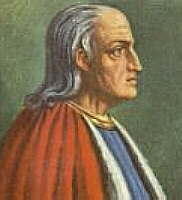(NON) EXISTENCE OF GOD - Part 3
(…continued from previous post. If it’s necessary check it from here) The ontological argument attempts to prove God’s existence through abstract reasoning alone. The argument is entirely a priori, i.e. it involves no empirical evidence at all. Rather, the argument begins with an explication of the concept of God, and seeks to demonstrate that God exists on the basis of that concept alone. This argument is based on the ideas of St. Anselm: “But clearly that than which a greater cannot be thought cannot exist in the understanding alone. For if it is actually in the understanding alone, it can be thought of as existing also in reality, and this is greater... Without doubt, therefore, there exists, both in the understanding and in reality, something than which a greater cannot be thought.”
The ontological argument attempts to prove God’s existence through abstract reasoning alone. The argument is entirely a priori, i.e. it involves no empirical evidence at all. Rather, the argument begins with an explication of the concept of God, and seeks to demonstrate that God exists on the basis of that concept alone. This argument is based on the ideas of St. Anselm: “But clearly that than which a greater cannot be thought cannot exist in the understanding alone. For if it is actually in the understanding alone, it can be thought of as existing also in reality, and this is greater... Without doubt, therefore, there exists, both in the understanding and in reality, something than which a greater cannot be thought.”Basically he says “Think about a perfect, faultless being. If such a being cannot exist then that makes him less perfect. Therefore such a perfect being is exist and therefore God is exist”. The argument is ingenious. It has the appearance of a linguistic trick, but it is a difficult task to say precisely what, if anything, is wrong with it. All forms of the argument make some association between three concepts: the concepts of God, of perfection, and of existence. Very roughly, they state that perfection is a part of the concept of God, and that perfection entails existence, and so that the concept of God entails God’s existence.
The critics of the ontological argument are no less distinguished than are its advocates. Among them is St Thomas Aquinas, rejected the ontological argument in his Summa Theologica. The most vaunted criticisms of the ontological argument, however, are those of Immanuel Kant. Kant argued against the ontological argument on the grounds that existence is not a property of objects but a property of concepts, and that whatever ideas may participate in a given concept it is a further question whether that concept is instantiated.
But there is also a simple argument against ontological argument. If there is a need for a first cause, first mover (and according to theists God is a cause of his existence), i.e. God is a necessary being, why not is this cause Big Bang itself? If you picture God not as an old man with a beard like Michelangelo did, but as a cosmic reason, then it’s make even more sense. A God’s existence being first as a cause of his existence and then creating the universe and anything beyond that is unnecessary. At least it has the same probability as saying that Big Bang is God.
Besides, even if there is a cause before Big Bang or something outside universe, it’s not an evidence for God’s existence. Actually the term “before Big Bang” is also meaningless, because time is created with Big Bang, there is no such a thing as “before”. But our reason and thinking cannot understand this idea because we have to refer everything to time.
But beyond these discussions and arguments, the main belief in all monotheist religions (i.e. Judaism, Christianity and Islam) accept the idea of an Omnipotent (all-powerful) and an Omniscience (all-knowing) God. [I don’t want to discuss the differences between these religions because it does not effect the main idea of God. In fact, the ideas like hell, heaven, judgment day, afterlife and the power of God are similar in almost every main religion] If we look at the idea of God from these points, there are many holes!
Which we will look at in the next post…
2 Noises:
Proof of GOD...
Explanation:
P(psi) P is "positive"
G(x) x have the property God
ess. essential
E existing
• (bullet) Necessary
This was written by Kurt Goedel.
I posted this previously in my blog. Nice blog you have here, by the way.
Well, Goedel was a genius mathematician and inventor of "incompleteness theorem". I'm not a mathematician but as far I know, he proved the existence of theorems that are "true" but impossible to be proven. Too sad that this great mind had suffered from paranoid psychological disorder. It doesn't say anything of course, he is still a genius.
Post a Comment
<< Home